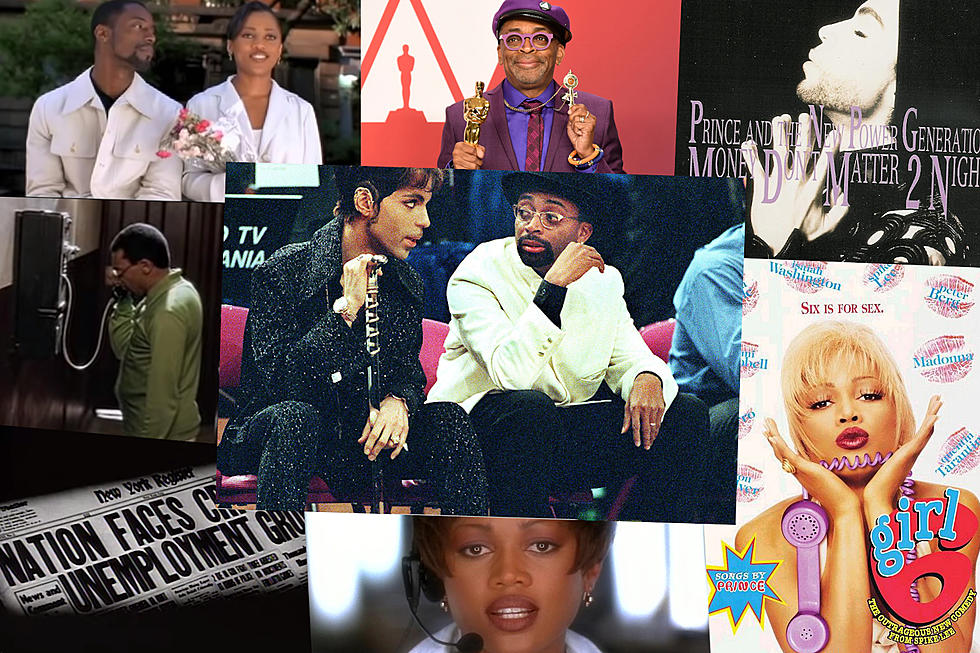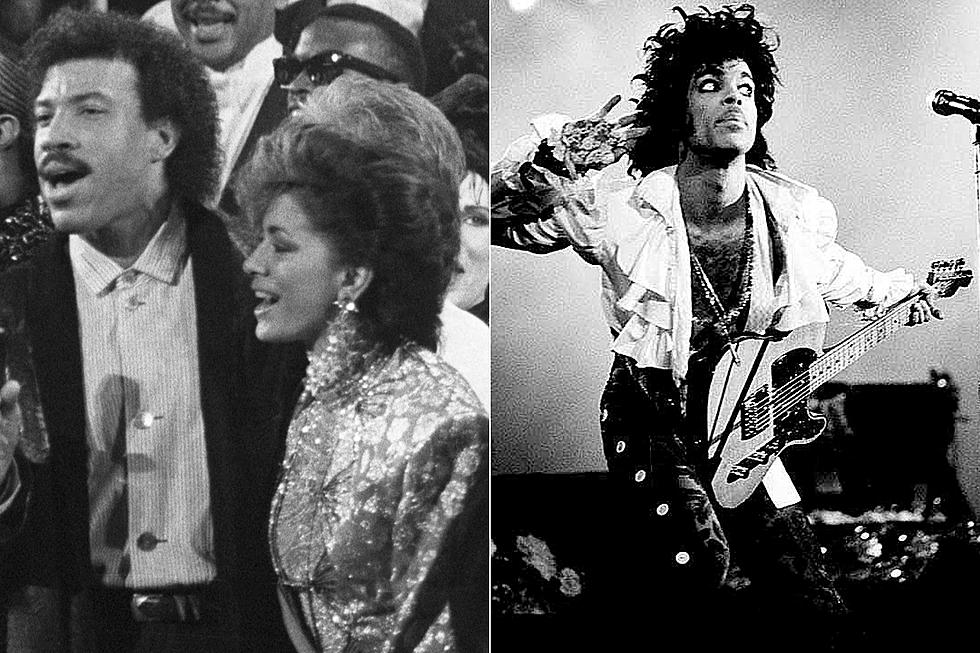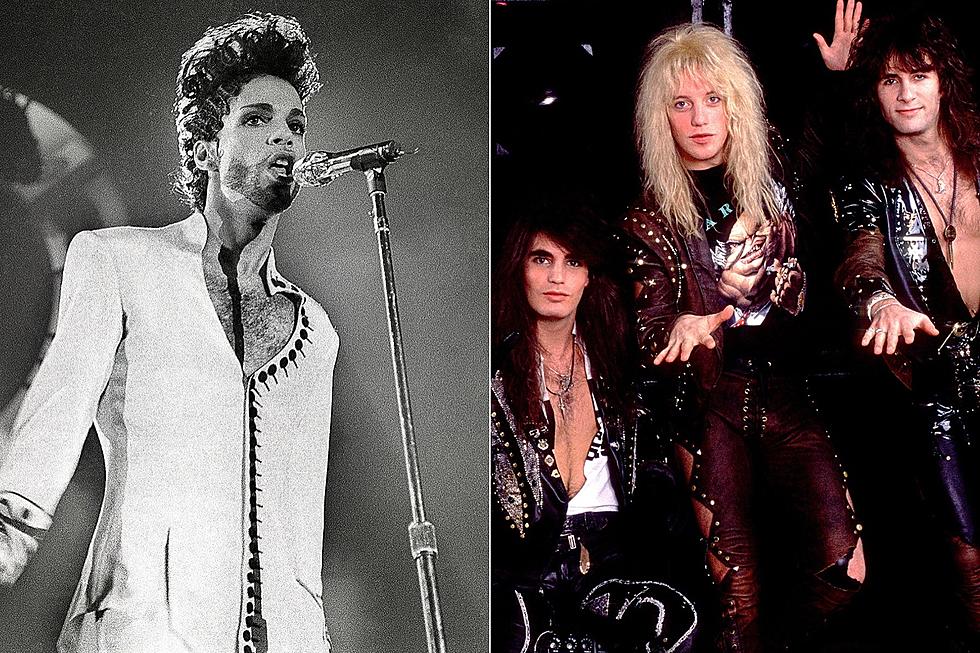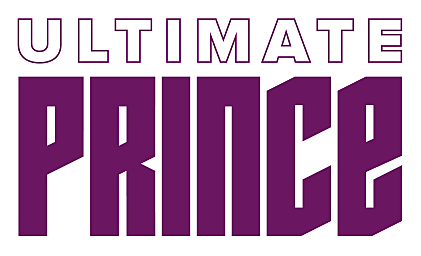
Revisiting Prince and Spike Lee’s Long and Productive Friendship
Wildly impressed with Spike Lee's debut feature-length film, She's Gotta Have It, Prince invited the Brooklyn director over for a visit at his Paisley Park complex in 1986. The pair instantly clicked - exchanging notes, ideas and inspirations for their next projects.
A decades-long friendship had begun.
As black men growing up in the early days of the civil-rights movement, Prince and Lee both kept their eyes and ears open to the revolution occurring around them, channeling the energy into their work. Mutually interested in pushing the limits of their art, the duo's respective worlds seemed destined to collide.
Prince, working on a new album with his band, the New Power Generation, asked Lee to direct the video for his song "Money Don't Matter 2 Night," which was released in 1991. The short film Lee produced followed a black family as they struggled to make ends meet.
Watch Prince & the New Power Generation's 'Money Don't Matter 2 Night'
"If he didn't have the belief in my ability, he would've never called me out of the blue, so that wasn't a problem," Lee told OkayPlayer in 2016. "There was no problems. In fact, he didn't need to give me notes, you know? He said 'love it,' and they just put it out."
Five years later, the pair teamed up again, this time for an even larger endeavor. In 1996, the Artist Formerly Known as Prince provided a collection of new and previously released songs for the soundtrack to Lee's movie Girl 6.
"I just felt that Prince's music was the perfect fit, and he was gracious enough to contribute original music," said Lee. "You know, he wrote the title song 'Girl 6' and then he said, 'Spike, anything in my catalog, you can use,' so he was very, very, very, very, very giving."
The songs of Girl 6 would also be released as an album. In the liner notes, Lee expressed his gratitude to his friend for allowing the soundtrack to be credited to his former name of just Prince.
"Many thanks 2 The Artist Formerly Known as Prince," he wrote. "U made a great sacrifice to make this happen. I love U and U will see the dawn."
Watch the Trailer for Spike Lee's 'Girl 6'
In 1993, Prince changed his name to an unpronounceable "love" symbol in an effort to detach himself from what he considered an oppressively strict contract with his record company, Warner Bros. His main goal was to obtain legal and financial control over his master recordings, something he viewed as vital to the integrity of every artist.
"If you don't own your masters, your master owns you," he famously told Rolling Stone in 1996.
The following year, Lee sat down to interview the Artist Formerly Known as Prince and asked why African-American artists often struggled with ownership over their original work.
"I just hope to see the day when all artists, no matter what color they are, own their masters," Prince replied. "I think we can get the right lawyers, but I think we all need to change our mindset and go in specifically after that [ownership of master recordings] and not just take the pink Cadillac. Then you will see change."
Despite the drama of their respective legal battles, the two friends looked back fondly on previous years.
"I was pleasantly surprised and I like the film for the style in which you did it," Prince said of Girl 6. "I'd never seen that done before. The scene at Coney Island, where you used 'How Come U Don't Call Me Anymore,' is my favorite scene. In fact, it forced me to put that song back into our set. I said I would never play it again because I used to think I couldn't do it better than I did with my band the Revolution. But your film gave me newfound respect for the music."
Listen to Prince's 'How Come U Don't Call Me Anymore'
At the close of the decade, neither Prince nor Lee considered their collaborative work to be over.
"My hat goes off to anybody who can sit down and put their heads together," Prince said in the 1997 interview. "I am ready for something like that, because I am free and I am happy and I have time. There were a lot of things in the way before. I have nothing but time now, and I love getting older." "We've got to do a musical together," Lee said. "We have to do several," Prince agreed. "Some will hit and some won't, but hey, we have the time."
Unfortunately, time was not on their side. Though no new musicals or joint projects surfaced, the pair remained close friends until the day Prince died in 2016, catching up with one another every few months.
"It might be six, eight months before we talked, but when we talked, it was like, we see each other," Lee told The New York Times.
Just a few hours after news of Prince's death was made public on April 21, 2016, Lee held a tribute block party outside the office of his Brooklyn production company, where a mob of mourning fans sang along to "Let's Go Crazy," "Kiss" and "Purple Rain."
Six weeks later, he held another party, to celebrate what would have been his friend's 58th birthday.
Watch Spike Lee and Brooklyn Celebrate Prince
In 2019, Lee won his first Academy Award when BlacKkKlansman received an Oscar for Best Adapted Screenplay. Prince's "Mary Don't You Weep" was featured in the concluding segment of Lee's movie.
In another nod to his friend, Lee accepted the award dressed lavishly in purple with a large golden necklace shaped in the Prince symbol.
Watch Spike Lee Talk About His Oscar Win
"I said to myself, this is it," Lee said. "What could be more fitting than to have a Negro spiritual sung by Prince, just him and the piano in this movie. It was not a mistake. Prince wanted me to have that song in BlacKkKlansman. People can say I'm crazy, smoking crack, which I don't. Or eating the mushrooms, which I don't. I'm telling you, on my mother's grave, he wanted me to have this song."
Watch Prince's 'Mary Don't You Weep' Video
Prince Year by Year: 1977-2016 Photographs
More From Ultimate Prince









